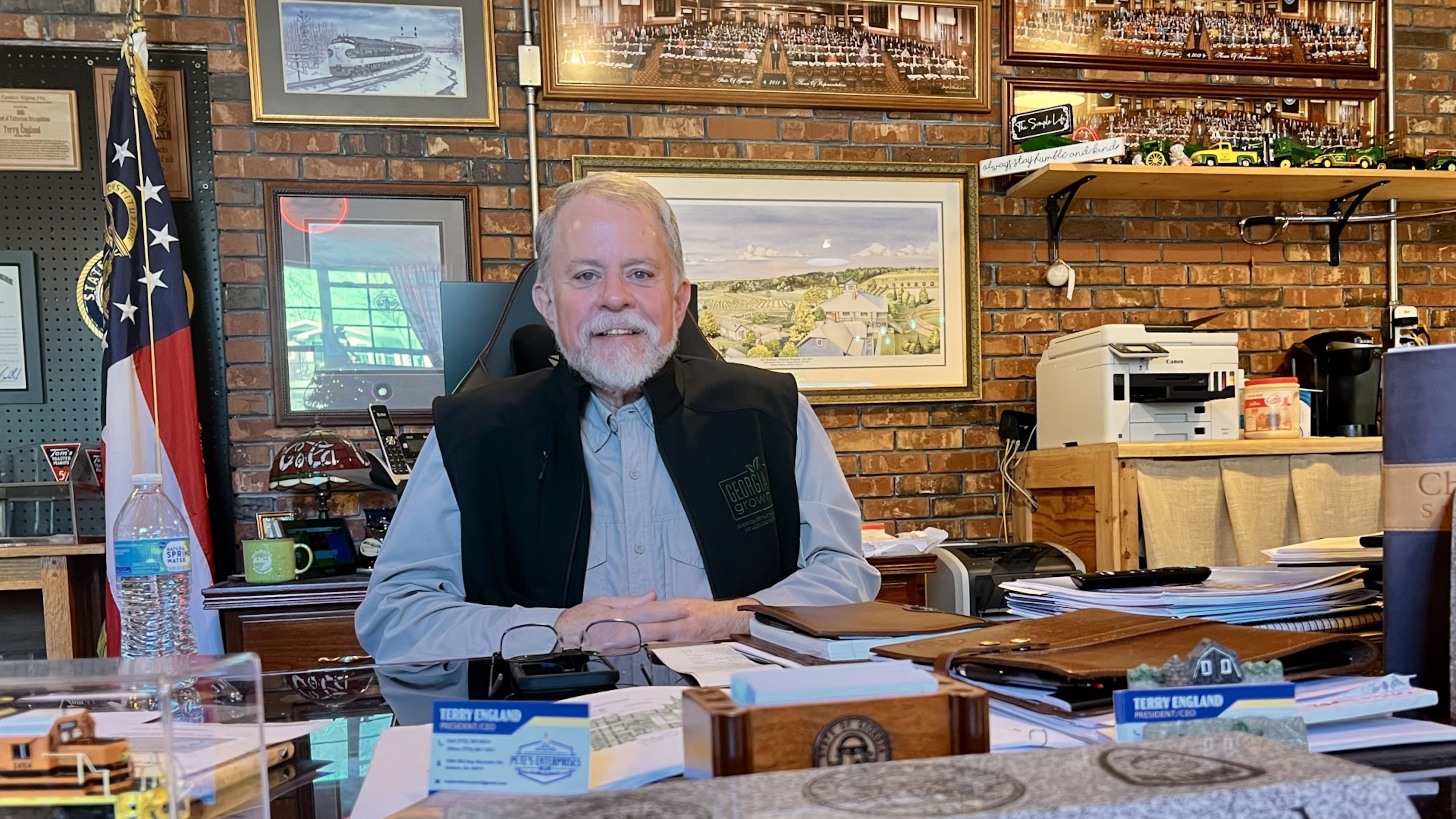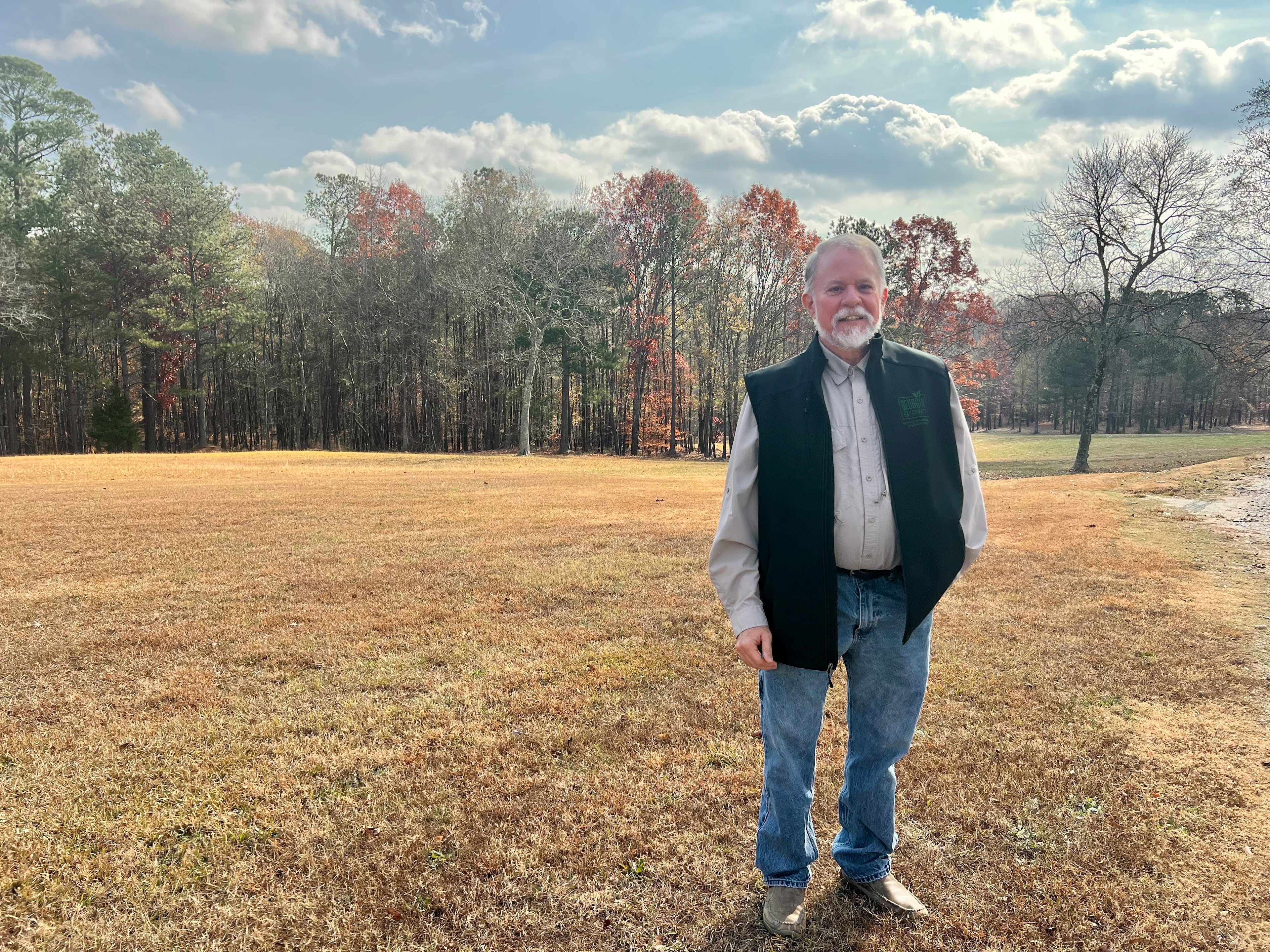Terry England nearly died on his farm. He knows he was saved for a reason.

Terry England remembers the exact moment earlier this year when he thought he might be dying.
A former state representative and chief of staff to the GOP House speaker, England was plowing fields and clearing fallen trees on his farm near Braselton in February. . As he used a skid steer to move logs down a hill, the machine fell off balance and violently catapulted him up to the metal roof of the cab overhead.
“I didn’t have a seat belt on, like a dummy, and bounced off the roof four or five times,” he recalled. “When the machine finally stopped, I’m sitting there paralyzed from head to toe. I just remember coming to and thinking, ‘I’ve got to make myself breathe.’”
His father and a neighbor heard the machine running, but not moving, a sure sign of trouble. They found him motionless and called an ambulance.
Earlier that day, England and his wife, Cindy, had watched the local news and saw a story about the new Level I trauma center opening at Northeast Georgia Medical Center in nearby Gainesville that day. It was a designation England had pushed for while he was the chair of the House Appropriations Committee.
After speeding by ambulance past cow fields and across the interstate, England became “PN 1,” or “Patient Number One,” at the newly upgraded trauma center, the first trauma case to come through its doors.
Longtime friend Chris Riley was the first person there, joined soon by friends, family, neighbors, and his boss, House Speaker Jon Burns. They kept a vigil as England was taken to emergency surgery to relieve swelling of his spinal cord. Seven hours later, he emerged with titanium rods bolting eight vertebrae together and a long road ahead to recovery. He was soon told he had suffered incomplete, inverted quadriparesis.
“When I woke up, I told Cindy, ‘I don’t like that we’re here and I don’t know what the good Lord’s got in mind,’” he said. “‘But he wouldn’t let this happen unless something good is supposed to come out of it.’”
The next few days were a mix of emotions. . Although he had regained some movement in his feet and toes, his hands and arms were slower to recover. He had no feeling on his skin, but efforts by nurses to stand him up sent pain radiating across his upper torso.
Visits from family and friends, including secret milkshake deliveries from state Rep. Matt Dubnik, lifted his spirits. But back at the Capitol, life moved on.
After 12 days in the intensive care unit in Gainesville and a wait for an available bed, England was transferred to the Shepherd Center in Atlanta, one of the best rehabilitation facilities in the country for brain and spinal cord injuries. It was another hospital that England had long worked to support during his time at the Capitol.

The next 10 weeks were a barrage of therapies and adjustments, struggles and milestones.
“There were constant miracles,” he said. “Not just with me, but with what I’ve seen with others. To see some of these kids stand for the first time since their injury … I’m laying there just crying like a baby.”
The entire community at the hospital cheered him and the other patients on.
“The janitor is pulling for you. The cafeteria folks are pulling for you,” he said. “The guy running the floor cleaning machine sees you up and walking and says, ‘Hey man, looking good. Keep it up. Keep it up.’”
England was released from Shepherd in May, nearly three months after his accident. He is still improving and setting goals for himself. And he’s still looking for the good reason he said God had for saving him in the first place.
“I don’t know yet,” he said.
Maybe it was for him to warn people, especially farmers, to wear seatbelts on any piece of equipment that has one. “If it has wheels, you should wear a seat belt,“ he said.
Maybe it was to continue his work to make the expanded Capitol complex more wheelchair and handicapped accessible, a reality he knows all too well now, as he helps Burns’ office on a part-time basis.
Maybe it was to lend an ear to the young patients on his floor who came to him with their worries about what their injuries might mean for their futures. Or maybe it was to continue to fight to expand access to health care in Georgia all across the state.
“Your access to quality health care should not be dictated by your ZIP code, and I think people realize that it is,” he said. “This has just made me that much more determined to try to figure out that answer.”
He has also gained the rare kind of perspective on life that a person gets when you come so close to losing it.
His advice to members of the Legislature today: “Love one another. Many of the battles that you think are so important, in the grand scheme of things, a week from now are not going to matter.”
Life is different now for Terry England, but he’s able to do much of what he enjoyed before the accident. He’s back on his tractors, always with a seat belt on, and still works in his home office, which is full of mementos from a life in farming and public service, including his Capitol desk.
He thinks often of the lyrics from the Lewis Family Band bluegrass song that says, “I’d rather have a rose today than all the flowers when I’m gone.”
“We got a lot of roses in all of this,” he said. “No one is more thankful this Thanksgiving than I am.”



